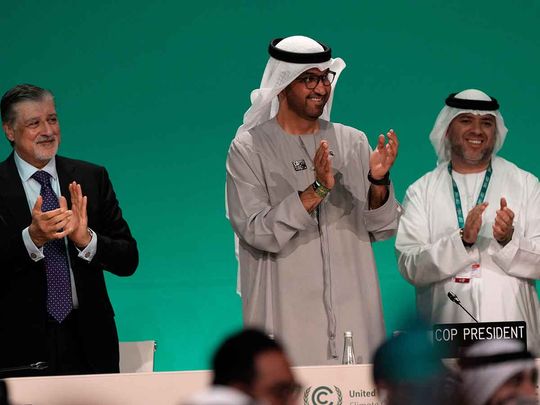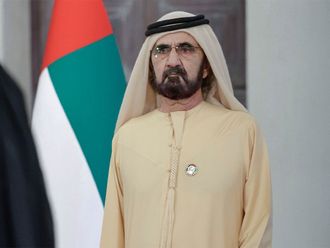
Dubai: The COP28 decision to transition away from fossil fuels is indeed a major step towards reducing emissions that warm the Earth. It’s historic since 30 years of annual climate summits have failed to achieve that. The UAE and COP28 chief Dr Sultan Al Jaber deserve accolades for driving the consensus among nearly 200 countries.
True, the wording didn’t mention “phase down” and “phase out”, and many may carp about it. Even the mention of fossil fuels in the agreement is a colossal feat, evident from the long-drawn discussions that spilled into the early hours of Wednesday.
A timeline for transition is absent. That’s because the growth of renewable energy hasn’t been rapid enough to replace fossil fuels. It would only be feasible when renewable energy is readily available. The pledge of around 120 countries to triple renewable energy capacity by 2030 will go a long way in realising the UAE Consensus.
The COP28 decision will echo around the world as it is a turning point in efforts to wean countries off oil, gas and coal. The results may not be tangible immediately, but it will undoubtedly impact the decisions of investors, financial institutions, private companies and governments.
If reaching a consensus was tough, implementing the decisions will be tougher. More so among developing countries, many of which continue to rely on coal. Remember that China, India and Indonesia didn’t join the pledge to scale up renewable energy production since it was linked to curbs on coal use. If China, which dominates the renewable energy industry, baulks at it, imagine the plight of developing countries. Countries must be compensated, and measures must be taken to remove coal from the energy supply chain.
It’s where the Green Climate Fund comes in. Although the fund was envisaged to assist developing countries in adopting practices to counter climate change, the mechanism to distribute funds to developing nations hasn’t been effective. Ruth Nankabirwa Ssentamu, Uganda’s minister of energy and minerals, says her country’s energy transition plan would require an investment of $70 billion, and the finance can only come from developing its fossil fuels. This is the case in many other countries. It highlights the need to get the climate fund working smoothly to reduce the reliance on fossil fuels.
It’s imperative to cut global greenhouse gas emissions by 43% by 2030 and 60% by 2035 to reach the target of net zero by 2050, which will help limit global warming to 1.5°C (above pre-industrial levels). Countries cannot afford to take the deal lightly as the world is grappling with rising carbon dioxide emissions.
Much heat has been on oil producers, but consumers are equally responsible for emissions. Industrialised nations are the biggest consumers of oil and gas. If the disruption in gas supply from Russia can lead to colder homes in Europe, what happens when oil and gas producers turn off the tap? So developed countries should lead the way by ramping up the use of renewable energy for domestic use. That would mean fewer combustion engine vehicles on the road.
What about jet fuel? The aviation industry has been experimenting with biofuels, but no firm solution exists. The industry has to accelerate its transition into biofuels. British Climate Minister Graham Stewart’s round trip to London to vote on the Rwanda plan rankled as the world races to find ways to curb emissions.
Oil is the primary source of revenue for many countries. A stoppage in production will cripple these economies, which is why a realistic target should be set for them to diversify their revenue sources and move towards renewables for energy requirements. In this context, the UAE must be complimented for bringing all countries on board, which went a long way in achieving what COP28 set out to do.
The talk is over. Now it’s the time for action.








